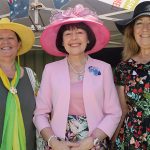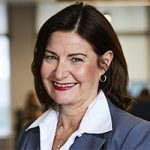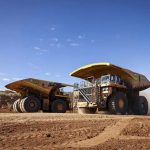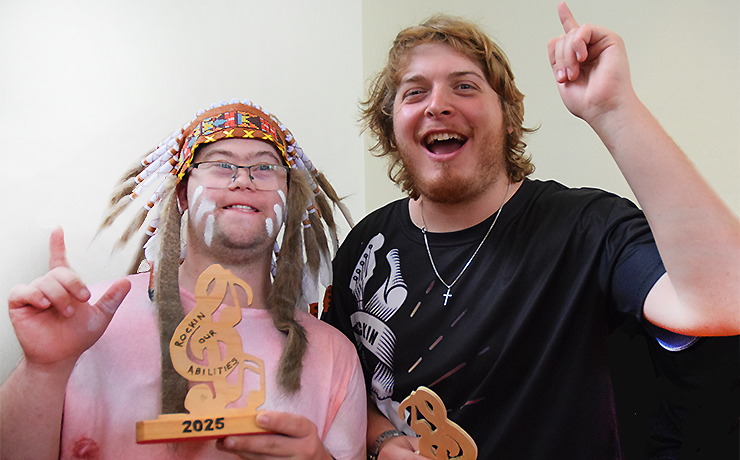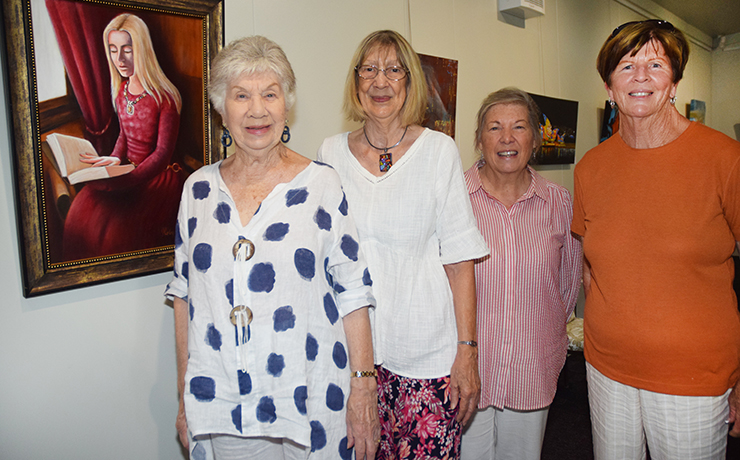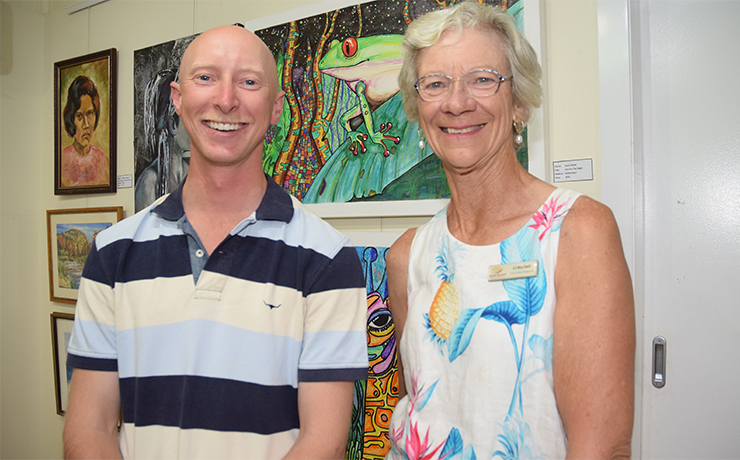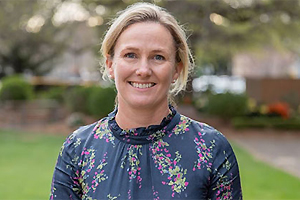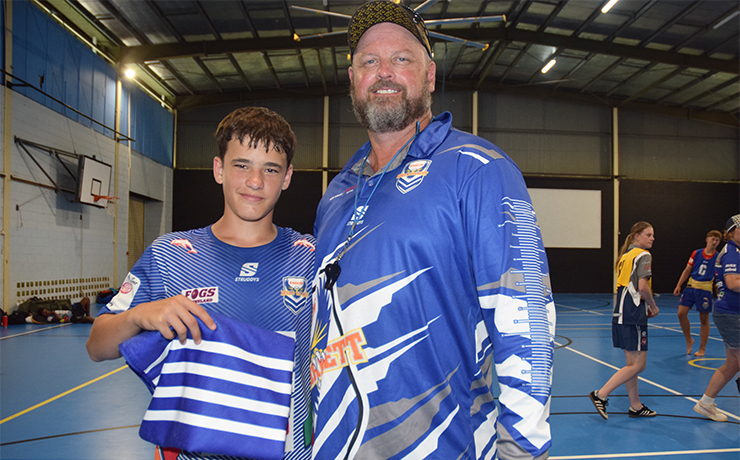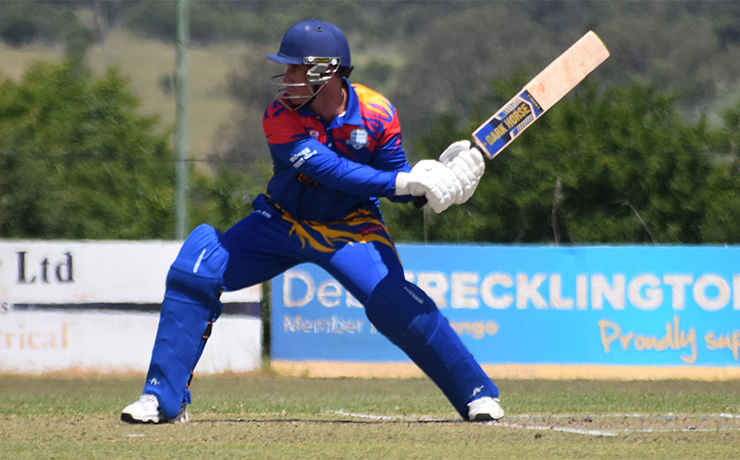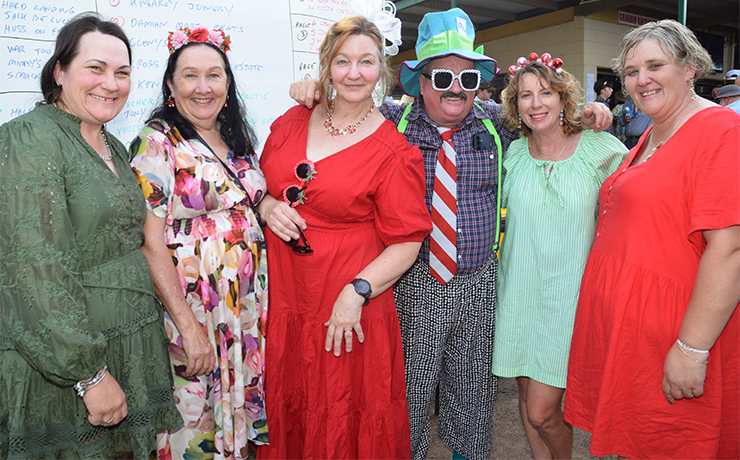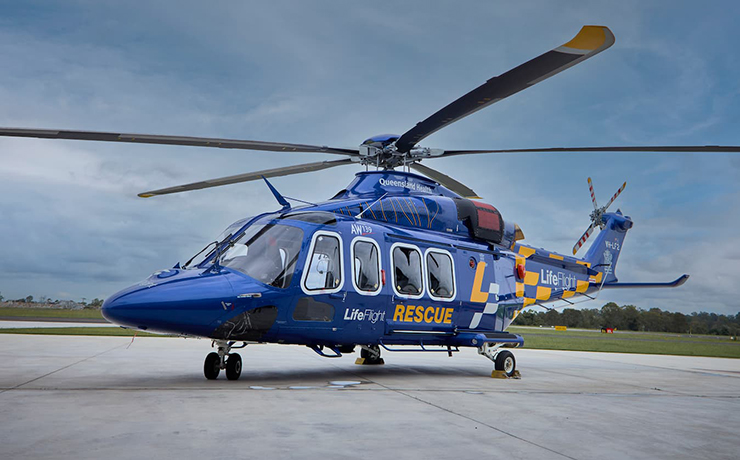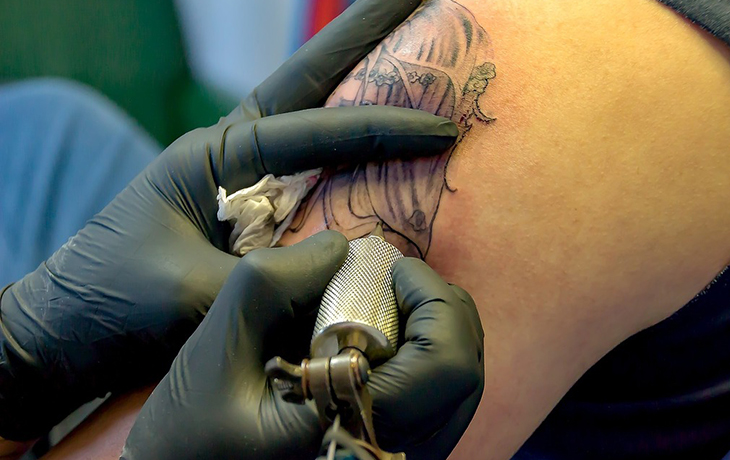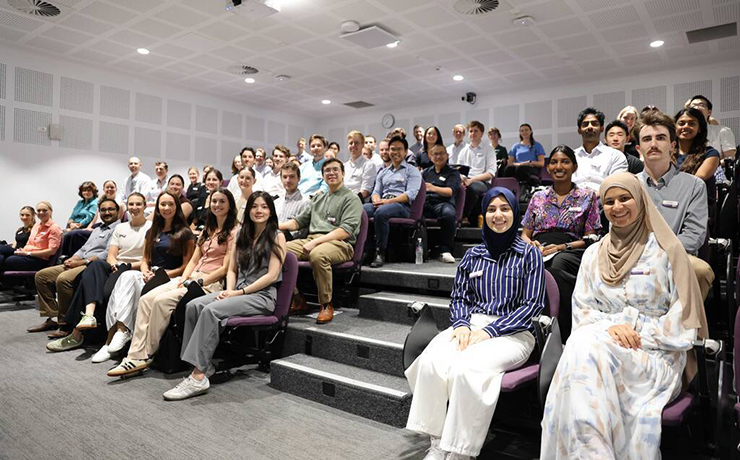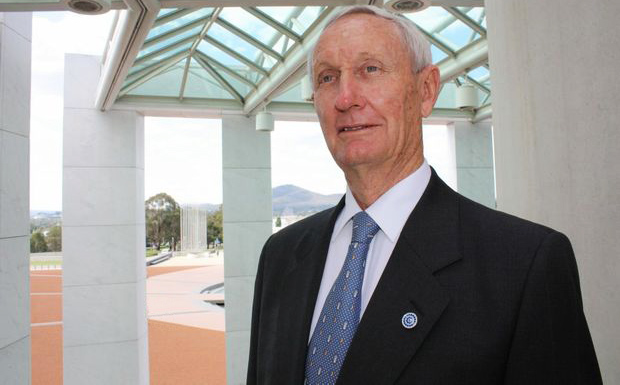
May 10, 2016
Veteran LNP politician Bruce Scott made his valedictory speech to Federal Parliament last week after serving the Maranoa electorate for more than 25 years.
Mr Scott, 73, announced in August last year that he would not re-contest the seat, which covers an area of southern Queensland stretching from the South Burnett to the Northern Territory border.
Since then he has suffered a bout of Bell’s Palsy which temporarily left one side of his face partially paralysed and forced him to withdraw from some events.
However, Mr Scott attended Parliament throughout his illness and delivered his farewell speech on May 4.
* * *
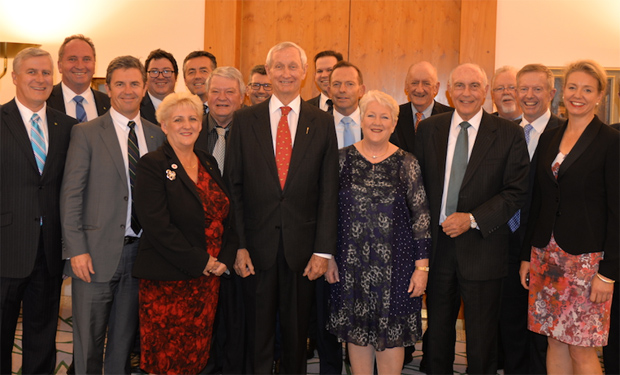
As this is my last speech in this place, I have to say that I rise with a sense of emotion, pride and humility. It is an absolute privilege to serve in the Parliament of Australia and, can I say, being only one of nine people since Federation to represent the seat of Maranoa, I find it hard to find the words to express the gratitude that I feel and the thanks that I owe to so many people for my time in this place.
I say ’emotion’ because I thought long and hard about whether I would retire. Also, there are some people in those dreadful drought areas in the west of my electorate who are going into their fourth year of drought, where their properties are destocked and their communities are wondering whether it will ever rain again or whether they will ever recover.
The last thing I wanted them to feel was that I was abandoning them. We have done a lot. We were able to achieve a lot. We were able to get some programs in place that will help those on the land and those in the towns who are feeling the continued effect of a long drought that shows no sign of breaking.
I grew up in western Queensland. I was born in Roma. Actually, some of you would know Roma for other reasons. It is the great rugby league town, with players such as Willie Carne, Darren Lockyer, Ray Higgs and, of course, Artie Beetson. I went to school with Artie in my very early days in Roma. In fact, I still recall taking a sandwich to school for Artie. We would sit down together under a tree and have lunch. Artie being of an Indigenous background experienced extreme disadvantage. As little kids it was good to be able to sit down together, as we did in those days. There was not the sort of discrimination then that some communities have today.
I remember later in life telling my young sons, who were playing rugby league for the little under six-stone Greens or at a carnival down at the Redcliffe Peninsula, how I knew Artie Beetson. They said, ‘Oh, dad, you must be joking.’ It was not until we were walking across an oval one day and Artie was walking towards me and he said ‘G’day, Scotty. How are you?’ that my little boys believed me. Dad does not tell stories like that; it was a true story.
Before I came into this place in 1990, I had had a background in running a property and growing up on the land. I had been to school in Roma. We went out onto land at Muckadilla. There was the Muckadilla State School, which is one of those schools that has a composite class — seven grades in one classroom, with one teacher. There were four ponies in the school ground, one of them being mine. It was a typical scene in many country towns when I was growing up in western Queensland.
I grew up on the land and so I know what it is like to have to send your children away to get an education beyond Year 7 and the costs associated with that. I think the member for Wide Bay, the former Deputy Prime Minister, touched briefly on this. There is a lot more work to do in this space, as he outlined.
I also know the wonderful joy you feel when you have a good season and also the heartbreak when the season turns against you or international commodity prices are corrupted and you are at the end of the line and feel the effect of that.
I have to say that when I entered this place there were floods right across western Queensland. Charleville was well and truly under water. I had been appointed to do something overseas at that time. I was visiting what was called in those days the USSR. I was behind the Iron Curtain. So I knew nothing of the fact that my electorate was under water. John Kerin, the Agriculture Minister at the time, had sent me to do a genetic comparison trial between Australian merinos and Russian merinos.
The other thing that happened very quickly at that time was the collapse of the Reserve Price Scheme, which then saw the collapse of the wool industry. We, in Opposition, and the Government had to look at how we could deal with a scheme that had been reasonably successful for a long time but it had built up a stockpile of wool which was going to mean that prices may not return to levels to meet that Reserve Price Scheme for some time. The moment we started to talk about it was the moment that the buyers around the world ceased to buy wool. They knew the day that we in the Opposition or the Government lowered support for that scheme, which was operated by the Australian Wool Corporation, would be the day that someone else would get wool cheaper than them.
So the discussion was: how do you deal with the four million bale stockpile? Do you take it down to the Pacific Ocean? Some said we should burn it. I said, ‘You don’t do that.’ Others said: ‘We’ve got 180 million sheep in Australia. That is twice as many as we really need. There is a lack of confidence. Maybe we should shoot 30 or 40 million sheep.’ Maybe that was part of a solution. Being a woolgrower myself and knowing what the wool industry meant to so many of my western Queensland towns, it was something that I would never, ever support.
The western Queensland towns that were dependent on the wool industry — the many shearers, their teams, their families — have never recovered. We have lost the shearers. We have lost their families. Many of the communities out there are half the size they were 20 years ago. Whether we can recover them in the future is still open for discussion. Outback tourism is going to be part of the solution. People have adjusted into other enterprises in the pastoral zone, but that will not take up the slack in employment that the wool industry was able to provide and that underpinned the economies of so many western Queensland towns.
Further east, there was an opportunity to farm the land, to move into cereal production. Where there is irrigation potential, as the now Deputy Prime Minister would be aware, in the St George, Condamine and Balonne area and across the rich soils of the Darling Downs there are other opportunities. I had to bring my voice to Canberra.
They were very, very tough times indeed, because I felt I had to be the voice of these people and bring their concerns to the Parliament. I was only one amongst 150 voices. Many sought my counsel but found it difficult to understand how we might be able to find a new way forward.
I had the enormous privilege of being awarded a Nuffield scholarship whilst I was still on the land. That took me to the United Kingdom and Europe to study the common agricultural policy of Europe. The large bulk of our commodities, particularly raw wool product, was sold there. For me, it was a life-changing experience. I still very proudly wear the Nuffield tie, which I have on tonight. I say to anyone out there involved in agriculture or associated with agriculture: if you are given the opportunity and awarded a Nuffield scholarship, take it with both hands. I do encourage young farmers to take it up.
Jim Gelch, the director of Nuffield Australia, now Nuffield International, has scholars on a global focus tour in the Americas. It really was one of the most life-changing experiences for me. It enabled me to look outside of my own community at the global opportunities that were presenting themselves and continue to present themselves and allowed me to think a little differently to the way I had been, perhaps — not being insular but looking at Australia’s market potential only.
The electorate of Maranoa is the largest in Queensland and people often say to me, ‘Well, how big is that?’ I have very good colleagues and friends from Victoria who ask me. I say, ‘Let me put it this way. When I’m in the largest town in my electorate’ — Warwick, on the New England Highway, in the east of the electorate — ‘it’s actually a shorter drive to Melbourne than it is to the west of my electorate.’ It is three times the size of Victoria, and I have been privileged to have many of you visit my electorate.
Prime Minister, it is further from Warwick to Birdsville than it is from Warwick to Melbourne. When the sun is rising Warwick, it will be 56 minutes before it rises in Birdsville, and yet it only takes 24 hours to go around the world. But stretched across that vast land are mineral wealth, agricultural wealth and enormous opportunity.
As you said, Prime Minister, ‘There has never been a more exciting time to be in government;’ nor has there ever been a more exciting time for many parts of my electorate with the opportunities that are in front of us, and I am just as excited about them as well.
I want to talk a little about the great Outback. I talk about the great, rich soils of the Darling Downs. My colleagues across the border, including the Deputy Prime Minister, would say, ‘Your soils are not as good as ours,’ but that is a debate we will have outside of this place. I know the Member for Parkes would say that about his electorate, but I can assure you that the rich Darling Downs contains magnificent soils — and I have little story to tell about them.
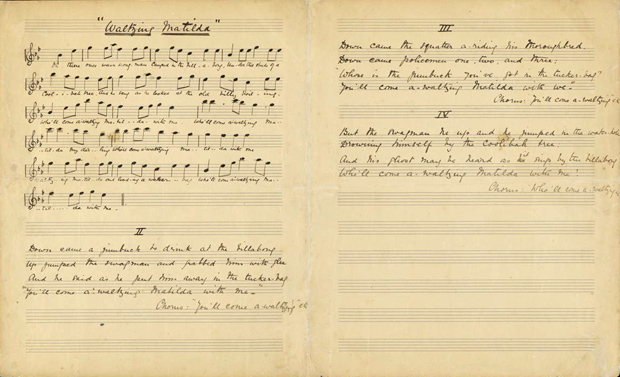
But the great Outback, where the inland rivers run into great Lake Eyre — the Diamantina, the Georgina, the Thomson and the Barcoo, all of those great rivers out there that empty sometimes, with a little bit this year going into Lake Eyre — form part of, I think, the character of us as Australians.
In fact, that part of Australia inspired some of our great bush ballads to be written, and I refer particularly to Banjo Paterson. When he was at Dagworth Station in 1895, north-west of Winton in the electorate of Maranoa on the Diamantina, he sat down one night with Christina Macpherson, who played a Scottish tune Craigielea and he put words to that tune, the great tune that we call Waltzing Matilda.
Prime Minister, I note also that, whilst it is our unofficial national anthem, it is so often used. Indeed, it was used on Anzac Day this year, when you were given the salute as you arrived at the parade ground for the Anzac Day service at the Australian War Memorial — a few bars of Waltzing Matilda were heard. I think it grabs all of us from time to time, because there is a story there to be told in that song. But I raise it tonight for another purpose, because the custodian of that song is the Winton Shire Council.
About 15 months ago, tragically, the centre that they had established in town to collect the artefacts and the stories and tell the history, as part of a tourism venture for people to visit and learn more about the story of Waltzing Matilda, was burnt down — but their spirit has not burnt down with it. They are going to rebuild that centre. They do have insurance money, and they have applied for some money under our Stronger Regions program. During this campaign, I will be supporting their quest for some money to help that community re-establish the heart of the Waltzing Matilda Centre again. I use this time, Prime Minister, tonight to highlight that as an opportunity, but I say it could come from both sides of the House.
I think we all see Waltzing Matilda as our national song; $6 million would make all the difference — they have $12 million of their own money. The other thing it would do, with this dreadful drought that still prevails out there, is bring job opportunities in the construction phase. Purchasing products locally is one of the things we are doing now, but rebuilding that centre would support a community to re-establish the heart and soul of the story behind Waltzing Matilda, which Banjo Paterson sat down in the electorate of Maranoa — which I am so proud to represent for another day or so — in 1895 and wrote the words for. I will leave it for others to see what they think of that.

Another story I wanted to touch on is the great story of Qantas. The first Qantas board meeting was in Winton. Its heritage now rests in Longreach. They used to make their aircraft at Longreach in the early days — they actually made them there, constructing them out of timber and fabric. There is a story there. It was the inspiration of McGinness, Fysh and McMaster, three veterans of the First World War who came back to Australia after Gallipoli. They flew in a light aircraft in those very intrepid early days and thought, ‘Maybe one day we’ll be able to fly around the world’ — and so we do.
I am so proud of Qantas, with its birthright in the electorate of Maranoa. In four years time it will celebrate 100 years. It is the oldest continuous airline in the world and I think we are all proud of the service it gives to us. You step on board a flight when you are overseas, and it does feel like home when you get on, and you know you will get home with the wonderful record that they have as an airline. I will leave it, perhaps, for others to look at whether we can support that, but I would say there is an opportunity there to look at how we can support Qantas. I have spoken to Alan Joyce about this and I think the Qantas board must also step forward and help with the centre in Longreach, where the wonderful story of Qantas, and the history and the heritage, is told. Indeed, that story also forms part of our nation’s heritage.
Prior to the last election, when Tony Abbott was our Leader of the Opposition, he will recall that we committed $5 million to the Australian Stockman’s Hall of Fame and Outback Heritage Centre to establish and build on the history of the stockmen and the heritage of our outback, including some recent additions to the gallery — the story of the Aboriginal stockmen. We have been able to capture their stories. The walkout at Wave Hill from the Vestey’s property has now been recorded. Maybe it was down here in some of the archives, but it is now being told out where it should be told — out in the Outback. There is a great story there.
We look at our national institutions here in Canberra and in our capital cities, which we do support, and we should support rightly some of the institutions out there where communities are doing a great deal, putting in a lot of their own money through councils and other ways to preserve what is an essential and important part of our nation’s heritage.
Prime Minister, Mr Speaker and my colleagues here, I had a long fight and a long battle, you might say, to see that the outback of my electorate was connected to the main optic fibre network. I have to say that the contracts were signed last week. It is a great example of three levels of government working together — Commonwealth Government, State Government and Local Government. Also, the contractors here are Telstra. I know when we lost government in 2007 we had plans to do it. We were going to use the Future Fund to do things like that into the future. We have had difficulties in convincing some people.
For towns of only a couple of hundred people, maybe satellite can deal with that into the future. But satellite was not going to satisfy the councils in the Barcoo and Diamantina shires and it was not going to satisfy the Member for Maranoa. On July 1, I think, they kick off construction.
Let me give you an example of the sort of population that can swell into those communities. Early in July, Jimmy Barnes and Paul Kelly are going to be raising money for Type 1 diabetes research. They are a holding a big two-day concert on Big Red, the last big sand dune in the Simpson Desert. They have had to cut off the tickets they have sold to that at 5500 people. They are coming from all over Australia. So it is not a community of 180 or 200. It will be a community of over 6500 when you count the children as well.
In 12 months time, people there will be able to enjoy better communications than are there now. I use that as an example of the fact that for many of the communities we look at we cannot look at the static population as the Census figures; we have to look at the transient population that comes from time to time, particularly during our tourism season. So I am delighted that we have made a great deal of progress in that area.
I wanted to touch on the great soils of the inner part of the electorate – Darling Downs down through Stanthorpe, the wine and tourism area of the Granite Belt and Kingaroy, the South Burnett, which is also in the electorate of Maranoa and, of course, has the farm of the Member for Wide Bay. I have been making sure that it is well cared for in his so-frequent absence, as the member for his family in that area.
I want to touch on the resource companies. We have had a lot of difficulty with those resource companies. In the early days with coal seam gas they believed that they had more rights to the land than the title deed holders.
We took on a battle there where the coal mines wanted to mine coal at Warra and a place called Haystack. The Member for Groom would know it well and would know many of the grain growers in that area. I will never forget we had to take them on because that was soil that was prime agricultural land. There are lands that we must reserve, put a circle around and say, ‘We will not be mining those areas to extract coal.’
There are other areas where we can, where there is lesser soil. There was a campaign which I supported which was run by that community. I think we mustered about 700 or 800 people in a meeting in Dalby one day to start the planning process. They said, ‘You can’t eat coal for breakfast.’ But I know what you can eat for breakfast; it is the food that is produced from that soil. I have to say we won the debate. It is classified as prime agricultural land. And we must never lose that commitment to support prime agricultural land. Where the reason is good, prime agricultural land will prevail.
I am sure you, Prime Minister, will know of some of the debates that have been in the Hunter Valley recently. I think we have to draw a line sometimes, and say, ‘That’s it; we’ll go elsewhere,’ until it is absolutely essential and technology will allow it, if we really do need what is under that prime agricultural soil to be mined.
I want to touch on my time as the Minister for Veterans’ Affairs and the Minister for Defence Personnel. It was a huge privilege to have been appointed a Minister by John Howard and Tim Fischer, as Deputy Prime Minister. I had more than 350,000 entitled veterans to look after. I never saw myself as the Minister for Veterans’ Affairs but rather as the veterans’ Minister, because it was their voice that I needed to bring to cabinet to make sure that we were, as we often said, looking after the veterans. We had to deal in those early days with the issue of PTSD. It was not really recognised as a war-related injury.
I well remember going to America, looking at what the US was doing and talking about whether it could be acknowledged as a true causal effect of service in a war zone. We had to deal with the privatisation of the veteran hospitals. Concord went to the state of NSW. Daw Park in South Australia went to the State Government. But the one in Greenslopes, and in Hollywood in Western Australia were sold to the Ramsay Group. The veterans came with us. That is what was important.
When we had completed that process, the department was actually the purchaser of health care for veterans not the provider of health care for veterans. We were spending something like $9 billion a year purchasing health care for veterans, under the entitlement and under Medicare item numbers, where we had agreements with doctors and providers of health care for veterans.
I was also struck by the wonderful people whom I had the responsibility for to be their voice here. We did a number of pilgrimages to Hellfire Pass, scene of the horror of Hellfire Pass in Thailand, where we established a commemorative pavilion. I remember taking a pilgrimage to Sandakan — to the death march — where 1850 were interned at the prisoner-of-war camp that was under the control of the Japanese.
But I will never forget, in my very first year as the Minister, leading a pilgrimage to Vietnam to the battlefield of Long Tan on August 18, 1996 — 30 years on from that battle. We had people who were young children when they lost their father — they never knew their father, killed in Vietnam. You could probably tell that story throughout history, with many of the other wars and conflicts of which we have been involved in. But I will never forget standing at the Long Tan Cross for a very simple service on August 18, 1996 with veterans and a war widow. We had a very simple service. The war widow came over to me and put her arms around me. She said, ‘Minister, thank you for bringing me here. This means so much to me.’ It was on that day 30 years earlier that she lost her husband on that very battlefield. She felt a spiritual connection to him. It was very much a healing process for her. I learned a great deal from her at that time.
We talk of loss. I contrasted her loss with my life. That was the year that Joan and I were planning our wedding. We had had the joy of watching our own children come into the world, grow up and have a business. We have had a wonderful life together. She had had 30 years as a war widow, being cared for by the Department of Veterans’ Affairs. So it bought into very sharp focus my responsibility to the veterans, the war widows and the children that were left behind. So when we talk of loss, it just reminded me every day, as I was the Minister, of my real responsibility to ensure that we always erred on the side of generosity with the entitlements that we provided to our veterans and war widows.
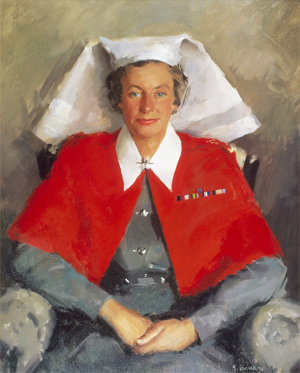
I will never forget meeting with Vivian Bullwinkel, the sole survivor of a massacre on Bangka Island. She came to me with those beautiful blue eyes she had — I will never forget them — and she said, ‘Minister, do you think we could have a memorial on Anzac Parade just for service nurses?’ I said, ‘Why not?’ She said, ‘Well, service chiefs don’t want it, chief ministers don’t want it, the National Capital Authority don’t want it.’ I said, ‘I’ll see what I can do. It will cost money.’ She said, ‘We might be able to raise some.’
Vivian was the sole survivor of the massacre on Bangka Island. She was one of 23 nurses who had got ashore at Bangka Island from the Vyner Brooke, which was scuttled off Borneo. They were ordered into the ocean by a patrol of Japanese who picked them up, and they were machine gunned from behind. She miraculously survived. She was wounded but lay there in the water until dark, enabling the story to be told of the horror of that massacre. I went up to the War Memorial one Sunday afternoon, as I was want to do some times, just to look around.
I hoped that staff would not see me because I did not need staff to say, ‘Minister, can we help you?’ I went to the Tomb of the Unknown Australian Soldier and I looked down Anzac Parade over the tomb and along the national axis through to Parliament House. I looked up at one of the 15 great stain-glassed windows. The central figure there is a nurse with a white veil and a red cape. I thought to myself: she is standing there right on the central axis. They have always been there. The simple inscription underneath her said, ‘Devotion’. From that point, I went forward and I said, ‘We are going to have to give this money, Prime Minister.’ And we did. It is their memorial on Anzac Parade. I am very proud to say that it is their memorial. It honours the service nurses.
If we think about our history, many of them in the First World War paid their own way to go to Gallipoli, Egypt and the Western Front to serve and to look after the sick, the dying and the wounded. So I believed it was more than appropriate that they be recognised on Anzac Parade.
I just want to end on a couple of points. I think the future for agriculture is extremely bright, with our free trade agreements that we signed with China, Korea and Japan.
Only today I tabled a report into the inquiry we conducted into trade and investment opportunities in the Middle East. It really is an exciting time ahead for agriculture and for many of our other resources that we have in Australia. So it is going to be wonderful for, I believe, any primary producers, but they need to know that, at the end of the day, we will have competition from other countries.
So the reforms that we do in this country in taxation and regulation, and in ensuring that our country is protected from the possible incursion of exotic diseases, are going to be extremely important into the future. The world does want our food. It is clean, it is green and it is fresh, and it is going to come into increasing demand in the future.
On that note, I just wanted to say something about the decision by the Treasurer to not support the sale of Sidney Kidman’s pastoral empire. I have to say that I agree with that decision. I had already been to see the Deputy Prime Minister in a bit of quiet diplomacy behind the scenes, saying, ‘I think we have a problem here.’
I am not anti-foreign investment. In fact, the oldest investment that has ever come into Australia was through the Australian Agricultural Company, which was given a grant in 1824. It is now a publicly listed company. You can buy shares in it on the Australian Stock Exchange. I supported the sale of Cubbie to foreign interests — a Chinese private company, with an Australian company, Lempriere Australia, taking a 20 per cent interest in it. Lempriere have been here since 1858. They are a wool-buying and mixed enterprise in agriculture and processing here and in New Zealand. They are a business operating in Australia.
One of the concerns I had, as I know it — I am not on the Foreign Investment Review Board, nor have I been privy to any of the information the Treasurer may have been — is that a large parcel of these properties are in my electorate. There is capacity of over 70,000 head of cattle on those properties. People said to me, ‘What is the business case that they have for this enterprise?’ At Cubbie they have continued to produce cotton on those properties. They have purchased a cotton gin. They have expanded the operation. Lempriere Australia, with a business base in Australia, manages Cubbie with the private enterprise investment coming from China.
The Kidman purchase offer was from a Chinese government-owned business enterprise with 20 per cent support from a rural property investment trust in Australia. It was not an operating business. The question I have been asked by constituents is: Do they intend to continue the sort of operation they have or, as some have suggested, will they be taking most of the cattle live to China where, rather than here in Australia, they will add the real value in processing and feedlotting?
I do not have these answers, but maybe we will find out whether there is any validity in them. There are suggestions that some of the business inputs — motor vehicles, steel and all the other inputs to a large cattle enterprise — might perhaps be imported directly out of China to these properties, so the stock and station agent in the towns would no longer be a provider of those and the motor machinery dealer would not be a provider of motor vehicles and repairs and tyres.
These are questions I have been asked, Prime Minister, and I have said that I do not have the answer. I think that with any of these foreign investments we need to know the business case of what they are proposing behind it to ensure we do not see stranded assets as a result of an enterprise. I put that on the table tonight, not being opposed to foreign investment — in fact, I am a great supporter of it. As I said, I supported the sale of Cubbie almost to my political death, because I believed it was right and the business model was right.
I have to say some thank you’s. I, like Warren Truss, found in a bit of clean-up recently my first receipt for joining the Young Country Party. It was probably more of a social club in those days, but we had a lot of fun. I think that was where we started to cut our teeth in terms of an interest in conservative politics. I want to pay tribute to those people who were with me then, who signed my receipt for 10 / 6d – Philippa Henzel. I applied and joined voluntarily.
The one ticket I cannot find is from when I was on cattle camps. The union official arrived at Kynuna Station, and tickets had to be written out for all the workers. We had to join; we had no option. I am really still searching for that AWU ticket. I had no choice in that, but I did have a choice in joining the Young Country Party and have voluntarily been a member ever since. I pay tribute to some of the early presidents and the people who kept the party together through very difficult times: Sir Robert Sparkes, Don McDonald, David Russell and Jenny Russell. They were there because they believed in the conservative cause.
I had a term as president of the National Party when Warwick Parer was president of the Liberal Party. Having both been in Parliament we understood the importance of working together rather than fighting each other on the same side, which had been almost a sport for many years and kept us out of government in Queensland.
I acknowledge the great support that I have had from people in my home town of Roma. People who supported me way, way back when I joined the Country Party are still there today. It is truly a humbling experience to have people who have been with you so long, who are so loyal, handing out how-to-vote cards and still believing in you. It is extremely humbling to have them still supporting you so long later.
Thank you to my staff. Shandra Baker joined me not long after I became the member. She has been my chief of staff for almost all these 26 years. It is an extraordinary commitment to make to a member. One of the things I often say about staff is that they make you look good. It has been a full-time job for Shandra and other members of my staff to make me look good. I say thank you to all my ministerial staff and the department. They really are so good. Once again, they make you look good. They deal with the difficulties from time to time. They do not even bring it to you sometimes, but they are wonderful people and they have been so supportive over such a long time.
I want to touch on some other people: Allison Armstrong, the late Alf Golder and Lindsay Reardon, and Philippa House and Ann Gibbes from my home town. They have been underscoring my campaigns. It was nothing for them to do a 1000km round trip on a weekend to attend a Divisional Council meeting, using their own money and their own time. I thank them and recognise them.
We have a great candidate, David Littleproud, to run in the seat of Maranoa. I am looking forward to getting behind him and making sure that he does win. In my first term I went to second preferences to get elected. I said to him that he must not do that. He is working hard and he will be a great addition, and if he is elected he will be a great member for Maranoa.
Finally, when I think of achievements in Maranoa and achievements in life, I think my greatest achievement is that of my family, who join me tonight.
My wife, Joan, my daughter and son-in-law, my son who has come from Hong Kong, and another son who is in New York. It is a little far to travel but I know he is over there listening to us tonight online. Without their support I could never have done this job. My wife, Joan, is successful in her own life. She has broken three glass ceilings. She is the very first woman ever elected to the local Council in my area and rose to be the deputy chairman of the Bungil Shire Council.
Those were the days. When she first became a member, the men did not quite know how they were going to deal with a woman on Council — and they did not for a while, either. They would go to lunch at the club, go to the bar and Joan would sit outside, until they thought that there must be a better way, and there was. She was the first women ever to be appointed to the Rural Lands Protection Board in Queensland, dealing with noxious weeds, and also the first woman elected to the Royal National Association at the Brisbane Ekka. I am very proud of her achievements, not in the name of women but because of the respect that people have had for her and for her opinions.
She has always been prepared to ask the question that needs to be asked. She has never been afraid to ask that question. She has been a great strength of mine. She has been the supporter of our children when I have not been there. She has always been my supporter when I have come home and wondered how to deal with some of the emotional issues that would plague you as you went to bed at night. She was always there, supportive, with kind words that got you through to the next day.

In conclusion, I thank the staff here, including the Speaker’s staff, the clerks and the COMCAR drivers. I want to put a special plug in for the library staff — it is a magnificent library we have here. We often use it and I acknowledge the work that they have done. They have done a great deal of work in relation to the Centenary of Anzac. It is worth looking at what they have done and the resource the library can be for you.
Whether it is the cleaning staff, the catering staff or the staff in the departments, they are all here for us. I have said to a number of people that we really want for nothing and we are very privileged to be here as Members of Parliament.
As a young child, I was inflicted with polio. For the many, many years that I took to recover it was the love of my mother, father, two brothers and broader family that supported me through it. I was in my very youth and I wondered whether I would ever be like other kids and walk properly again. It took many years to recover, but I never forget my father quoting a proverb to me. He said: ‘There was a man who thought he was badly off because he had no shoes, till he met a man who had no feet.’
In many ways that was a great strength for me as a barometer and a beacon for a large part of my life. We should count our blessings every day, and in this place we should count our blessings every day. We are blessed to be here, and that carries responsibilities with it to make sure that we do not leave people behind. It is within our power to make sure that we look after people and that we do not leave people behind. We have that power and we have that responsibility.
Finally, Winston Churchill once said that you make a living by what you get, but you make a life by what you give. I hope one day that people may judge that what I have given as the member for Maranoa has been adequate.
It has been an enormous privilege to serve as the Member for Maranoa. It has been a time in my life, and that of my family, that I will never forget. I thank members in this Chamber, and members before you, for the great support you have given to me. Prime Minister, I wish you and all your team great success in the forthcoming election.
This is not goodbye; this is just changing tack, as Bronwyn Bishop, the former Speaker, said. She and I were a great team, actually. We were often referred to as the odd couple.
We will start on a new path. I still have plenty to give. I want to make sure that you, Prime Minister, are supported, with your team, to be rightly returned to Government, underpinned by the Budget last night, which I have been out selling much of today.
I thank the House.






